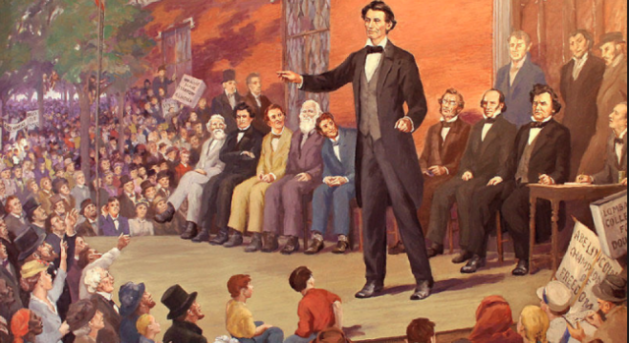Previously published at WGBHNews.org.
Here we go again.
Four years ago the media gave an enormous boost to Donald Trump by making him the star of their multi-candidate Republican presidential debates. Despite his racist demagoguery and his utter lack of qualifications, Trump was moved to center stage and allowed to talk longer than anyone else because of his poll numbers and his salutary effect on TV ratings.
This time, at least, the Democratic candidates getting the center-stage treatment are reasonably plausible future presidents. But during CNN’s two-night extravaganza this week, and at the NBC debates last month, the same flaws were on display: an emphasis on combat over substance, a ridiculous adherence to time limits (at least NBC let Kamala Harris and Joe Biden go at it), and the elevation of fringe candidates who really have no business being there.
As the historian Kevin Kruse put it:
"Senator Warren, your response?"
"Well, there are three things that are–"
"Thank you, we're out of time. Mayor Buttigieg?"
"What's most–"
"That's it! Congressman O'Rourke?"
"Se–"
"TIME!"— Kevin M. Kruse (@KevinMKruse) July 31, 2019
Although the moderators could have done a better job (I’ll get to that in a bit), the format itself is the real problem. CNN deserves credit for holding one-hour, one-candidate town halls with many of the contenders earlier this year. But how many viewers can make that sort of time commitment? The debates are what truly matter, and they are broken.
One alternative would be to schedule six hours of prime time over three nights for 15-minute interviews. You could actually accommodate all 24 candidates, and it would be a vast improvement over 15-second responses. Another idea comes from my former Northeastern colleague Alan Schroeder, an expert on presidential debates: bring in groups of two or three candidates for 15-minute rounds and have an open discussion. “The point is,” he said on Twitter, “there are much better ways to distribute the precious airtime.”
Even within the ridiculous constraints of the multi-candidate format, though, the moderators could have done better. In the first round, Chuck Todd took a lot of well-deserved heat with his demand for one-word answers to complicated policy questions (grunt once for “yes,” twice for “no”). This time, critics have targeted Jake Tapper for tossing undiluted Republican talking points at the Democrats and for all but encouraging the candidates to verbally assault each other. Tom Jones, who writes the newly renamed Poynter Report (and who, oddly enough, is a fan of Todd’s moderating style), described it this way:
“Tapper’s moderating strategy appeared to be nothing more than antagonizing the candidates into disagreeing with one another. Many of his questions were a version of, ‘Why is (such-and-such candidate) wrong?’
“That’s different than the approaches of fellow moderators Dana Bash and Don Lemon. Bash was the star of the night, asking candidates to state and defend their policy ideas — which is the point of a debate when voters are still trying to figure out who everyone is and who they might support. Lemon, meanwhile, started many of his questions with a very solid, ‘Tell us why you’re the best candidate to …’
“It’s not Tapper’s job to make the candidates look good or bad, but the leaders of the Democratic party could not have been happy that the tone of the debate was so nasty and that nastiness was often a direct result of Tapper’s questions.”
Or as the pollster Matt McDermott put it (via The Washington Post): “Imagine CNN asking in a Republican debate: ‘Democrats want to ensure health care for all Americans. You want to kill people. Care to respond?’”
So who won? I have no novel observations. Like just about everyone, I thought Elizabeth Warren was the week’s clear winner on both substance and style. They say you shouldn’t punch down, but her evisceration of some guy named John Delaney was one for the ages. Biden was OK, and much better than he was in June, even though he screwed a few things up and is already getting roasted for being disingenuous about his past and for not knowing the difference between a website and a text message. He was energetic, fought back, and launched a few attacks of his own. If Biden is going to drop in the polls, I’d say it won’t be quite yet.
Harris, who strikes many people (including me) as uniquely positioned to unite the progressive and moderate wings of the party, took a big step back from her breakthrough moment during the first round of debates. She blew it in several ways, including substance: she seemed utterly incapable of explaining her new health-care proposal coherently. That was a lost opportunity given the reservations people have over a pure single-payer Medicare for All plan on the one hand and the reluctance to simply nibble at the edges of Obamacare on the other.
Pete Buttigieg, Julián Castro, and especially Cory Booker all did well and probably deserve one more shot. But honestly, at this point it’s hard to imagine that the nominee will be anyone other than one of the frontrunners — Biden, Warren, Harris, and Bernie Sanders. We deserve to hear from the four of them directly. The others can be relegated to undercards and other events.
What do the media owe us in televised debates? Substance, focus, and seriousness of purpose. It’s a cliché, of course, to say that this is the most important election of our lifetime. But the stakes may be nothing less than a recommitment to democracy versus a continued slide into authoritarianism.
Grunt once if you agree, twice if you disagree.
Talk about this post on Facebook.
Discover more from Media Nation
Subscribe to get the latest posts sent to your email.

